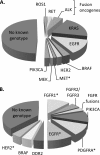The impact of genomic changes on treatment of lung cancer
- PMID: 23841470
- PMCID: PMC3826273
- DOI: 10.1164/rccm.201305-0843PP
The impact of genomic changes on treatment of lung cancer
Abstract
The remarkable success of epidermal growth factor receptor (EGFR) and anaplastic lymphoma kinase (ALK) tyrosine kinase inhibitors in patients with EGFR mutations and ALK rearrangements, respectively, introduced the era of targeted therapy in advanced non-small cell lung cancer (NSCLC), shifting treatment from platinum-based combination chemotherapy to molecularly tailored therapy. Recent genomic studies in lung adenocarcinoma identified other potential therapeutic targets, including ROS1 rearrangements, RET fusions, MET amplification, and activating mutations in BRAF, HER2, and KRAS in frequencies exceeding 1%. Lung cancers that harbor these genomic changes can potentially be targeted with agents approved for other indications or under clinical development. The need to generate increasing amounts of genomic information should prompt health-care providers to be mindful of the amounts of tissue needed for these assays when planning diagnostic procedures. In this review, we summarize oncogenic drivers in NSCLC that can be currently detected, highlight their potential therapeutic implications, and discuss practical considerations for successful application of tumor genotyping in clinical decision making.
Figures
Similar articles
-
Concomitant occurrence of EGFR (epidermal growth factor receptor) and KRAS (V-Ki-ras2 Kirsten rat sarcoma viral oncogene homolog) mutations in an ALK (anaplastic lymphoma kinase)-positive lung adenocarcinoma patient with acquired resistance to crizotinib: a case report.BMC Res Notes. 2013 Nov 26;6:489. doi: 10.1186/1756-0500-6-489. BMC Res Notes. 2013. PMID: 24279718 Free PMC article.
-
ALK, ROS1 and RET fusions in 1139 lung adenocarcinomas: a comprehensive study of common and fusion pattern-specific clinicopathologic, histologic and cytologic features.Lung Cancer. 2014 May;84(2):121-6. doi: 10.1016/j.lungcan.2014.02.007. Epub 2014 Feb 19. Lung Cancer. 2014. PMID: 24629636
-
Going beyond EGFR.Ann Oncol. 2012 Sep;23 Suppl 10:x197-203. doi: 10.1093/annonc/mds319. Ann Oncol. 2012. PMID: 22987962
-
Emerging Biomarkers in Personalized Therapy of Lung Cancer.Adv Exp Med Biol. 2016;890:25-36. doi: 10.1007/978-3-319-24932-2_2. Adv Exp Med Biol. 2016. PMID: 26703797 Review.
-
Immunotherapy for oncogenic-driven advanced non-small cell lung cancers: Is the time ripe for a change?Cancer Treat Rev. 2018 Dec;71:47-58. doi: 10.1016/j.ctrv.2018.10.006. Epub 2018 Oct 15. Cancer Treat Rev. 2018. PMID: 30359792 Review.
Cited by
-
Destaining of Diff-Quik stained cytologic smears is not necessary for the detection of anaplastic lymphoma kinase gene rearrangement in lung adenocarcinoma by fluorescence in situ hybridization.J Cytol. 2016 Jul-Sep;33(3):154-158. doi: 10.4103/0970-9371.188061. J Cytol. 2016. PMID: 27756989 Free PMC article.
-
Heuristic value-based framework for lung cancer decision-making.Oncotarget. 2018 Jul 6;9(52):29877-29891. doi: 10.18632/oncotarget.25643. eCollection 2018 Jul 6. Oncotarget. 2018. PMID: 30042820 Free PMC article.
-
Fast In-House Next-Generation Sequencing in the Diagnosis of Metastatic Non-small Cell Lung Cancer: A Hospital Budget Impact Analysis.J Health Econ Outcomes Res. 2023 Jun 26;10(1):111-118. doi: 10.36469/001c.77686. eCollection 2023. J Health Econ Outcomes Res. 2023. PMID: 37389301 Free PMC article.
-
ALK inhibitors in non-small cell lung cancer: the latest evidence and developments.Ther Adv Med Oncol. 2016 Jan;8(1):32-47. doi: 10.1177/1758834015617355. Ther Adv Med Oncol. 2016. PMID: 26753004 Free PMC article. Review.
-
Expression Profiles of AQP3 and AQP4 in Lung Adenocarcinoma Samples Generated via Bronchoscopic Biopsies.J Clin Med. 2022 Oct 9;11(19):5954. doi: 10.3390/jcm11195954. J Clin Med. 2022. PMID: 36233821 Free PMC article.
References
-
- Sandler A, Gray R, Perry MC, Brahmer J, Schiller JH, Dowlati A, Lilenbaum R, Johnson DH. Paclitaxel-carboplatin alone or with bevacizumab for non-small-cell lung cancer. N Engl J Med. 2006;355:2542–2550. - PubMed
-
- Scagliotti GV, Parikh P, von Pawel J, Biesma B, Vansteenkiste J, Manegold C, Serwatowski P, Gatzemeier U, Digumarti R, Zukin M, et al. Phase III study comparing cisplatin plus gemcitabine with cisplatin plus pemetrexed in chemotherapy-naive patients with advanced-stage non-small-cell lung cancer. J Clin Oncol. 2008;26:3543–3551. - PubMed
-
- Schiller JH, Harrington D, Belani CP, Langer C, Sandler A, Krook J, Zhu J, Johnson DH Eastern Cooperative Oncology Group. Comparison of four chemotherapy regimens for advanced non-small-cell lung cancer. N Engl J Med. 2002;346:92–98. - PubMed
-
- Drilon A, Rekhtman N, Ladanyi M, Paik P. Squamous-cell carcinomas of the lung: emerging biology, controversies, and the promise of targeted therapy. Lancet Oncol. 2012;13:e418–e426. - PubMed
Publication types
MeSH terms
Substances
Grants and funding
LinkOut - more resources
Full Text Sources
Other Literature Sources
Medical
Research Materials
Miscellaneous


